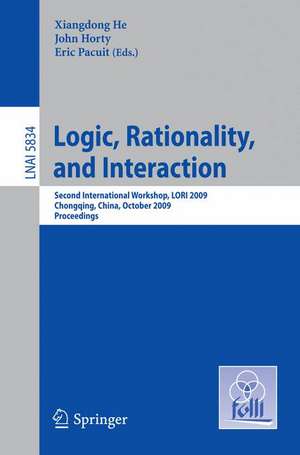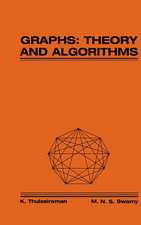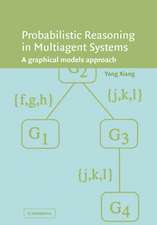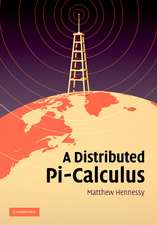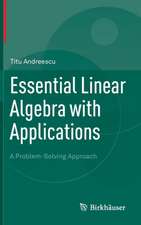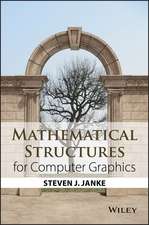Logic, Rationality, and Interaction: Second International Workshop, LORI 2009, Chongqing, China, October 8-11, 2009, Proceedings: Lecture Notes in Computer Science, cartea 5834
Editat de Xiangdong He, John Horty, Eric Pacuiten Limba Engleză Paperback – 23 sep 2009
The 24 revised full papers presented together with 8 posters were carefully reviewed and selected from a flood of submissions. The workshops topics include but are not limited to semantic models for knowledge, for belief, and for uncertainty, dynamic logics of knowledge, information flow, and action, logical analysis of the structure of games, belief revision, belief merging, logics for preferences and utilities, logics of intentions, plans, and goals, logics of probability and uncertainty, argument systems and their role in interaction, as well as norms, normative interaction, and normative multiagent systems.
Din seria Lecture Notes in Computer Science
- 20%
 Preț: 1061.55 lei
Preț: 1061.55 lei - 20%
 Preț: 307.71 lei
Preț: 307.71 lei - 20%
 Preț: 438.69 lei
Preț: 438.69 lei - 20%
 Preț: 579.30 lei
Preț: 579.30 lei -
 Preț: 410.88 lei
Preț: 410.88 lei - 17%
 Preț: 427.22 lei
Preț: 427.22 lei - 20%
 Preț: 596.46 lei
Preț: 596.46 lei - 15%
 Preț: 448.04 lei
Preț: 448.04 lei - 20%
 Preț: 353.50 lei
Preț: 353.50 lei -
 Preț: 389.49 lei
Preț: 389.49 lei - 20%
 Preț: 309.90 lei
Preț: 309.90 lei - 20%
 Preț: 645.28 lei
Preț: 645.28 lei - 20%
 Preț: 763.23 lei
Preț: 763.23 lei - 15%
 Preț: 580.46 lei
Preț: 580.46 lei - 20%
 Preț: 310.28 lei
Preț: 310.28 lei - 20%
 Preț: 655.02 lei
Preț: 655.02 lei - 20%
 Preț: 1183.14 lei
Preț: 1183.14 lei - 20%
 Preț: 340.32 lei
Preț: 340.32 lei -
 Preț: 449.57 lei
Preț: 449.57 lei - 20%
 Preț: 591.51 lei
Preț: 591.51 lei - 18%
 Preț: 938.83 lei
Preț: 938.83 lei - 20%
 Preț: 337.00 lei
Preț: 337.00 lei - 20%
 Preț: 649.50 lei
Preț: 649.50 lei - 20%
 Preț: 607.40 lei
Preț: 607.40 lei - 20%
 Preț: 1414.79 lei
Preț: 1414.79 lei - 20%
 Preț: 1024.44 lei
Preț: 1024.44 lei - 20%
 Preț: 583.40 lei
Preț: 583.40 lei - 20%
 Preț: 453.32 lei
Preț: 453.32 lei - 20%
 Preț: 575.49 lei
Preț: 575.49 lei - 20%
 Preț: 1075.26 lei
Preț: 1075.26 lei - 20%
 Preț: 585.88 lei
Preț: 585.88 lei - 20%
 Preț: 825.93 lei
Preț: 825.93 lei - 17%
 Preț: 360.20 lei
Preț: 360.20 lei - 20%
 Preț: 763.23 lei
Preț: 763.23 lei - 20%
 Preț: 340.32 lei
Preț: 340.32 lei - 20%
 Preț: 504.58 lei
Preț: 504.58 lei - 20%
 Preț: 369.13 lei
Preț: 369.13 lei - 20%
 Preț: 580.93 lei
Preț: 580.93 lei - 20%
 Preț: 343.62 lei
Preț: 343.62 lei - 20%
 Preț: 350.21 lei
Preț: 350.21 lei - 20%
 Preț: 583.40 lei
Preț: 583.40 lei - 20%
 Preț: 583.40 lei
Preț: 583.40 lei - 15%
 Preț: 438.59 lei
Preț: 438.59 lei - 20%
 Preț: 341.95 lei
Preț: 341.95 lei - 20%
 Preț: 238.01 lei
Preț: 238.01 lei - 20%
 Preț: 538.30 lei
Preț: 538.30 lei
Preț: 336.21 lei
Preț vechi: 420.26 lei
-20% Nou
Puncte Express: 504
Preț estimativ în valută:
64.33€ • 67.17$ • 53.12£
64.33€ • 67.17$ • 53.12£
Carte tipărită la comandă
Livrare economică 15-29 aprilie
Preluare comenzi: 021 569.72.76
Specificații
ISBN-13: 9783642048920
ISBN-10: 3642048927
Pagini: 329
Ilustrații: XI, 329 p.
Dimensiuni: 155 x 235 x 25 mm
Greutate: 0.52 kg
Ediția:2009
Editura: Springer Berlin, Heidelberg
Colecția Springer
Seriile Lecture Notes in Computer Science, Lecture Notes in Artificial Intelligence
Locul publicării:Berlin, Heidelberg, Germany
ISBN-10: 3642048927
Pagini: 329
Ilustrații: XI, 329 p.
Dimensiuni: 155 x 235 x 25 mm
Greutate: 0.52 kg
Ediția:2009
Editura: Springer Berlin, Heidelberg
Colecția Springer
Seriile Lecture Notes in Computer Science, Lecture Notes in Artificial Intelligence
Locul publicării:Berlin, Heidelberg, Germany
Public țintă
ResearchCuprins
Contributed Papers.- Expressing Properties of Coalitional Ability under Resource Bounds.- Dynamic Context Logic.- Toward a Dynamic Logic of Questions.- A General Family of Preferential Belief Removal Operators.- Computing Compliance.- Attributing Distributed Responsibility in Stit Logic.- Characterizations of Iterated Admissibility Based on PEGL.- Can Doxastic Agents Learn? On the Temporal Structure of Learning.- Agreement Theorems in Dynamic-Epistemic Logic.- Learning and Teaching as a Game: A Sabotage Approach.- First-Order Logic Formalisation of Arrow’s Theorem.- Twelve Angry Men: A Study on the Fine-Grain of Announcements.- Dynamic Testimonial Logic.- From the Logical Point of View: The Chain Store Paradox Revisited.- A Cooperation Logic for Declaration Structures.- Intentions and Assignments.- Epistemic Games in Modal Logic: Joint Actions, Knowledge and Preferences All Together.- Dynamic Epistemic Logic of Finite Identification.- An Epistemic Logic for Planning with Trials.- Obligations in a Responsible World.- Dynamic Epistemic Temporal Logic.- Measurement-Theoretic Foundation of Preference-Based Dyadic Deontic Logic.- An Update Operator for Strategic Ability.- Strategy Elimination in Games with Interaction Structures.- Posters.- The Logic of Knowledge-Based Cooperation in the Social Dilemma.- Getting Together: A Unified Perspective on Modal Logics for Coalitional Interaction.- Oppositional Logic.- Deliberate Contrary-to-Law Action.- Mono-Agent Dynamics.- Modal Expressivity and Definability over Sets.- Dynamic Logics for Explicit and Implicit Information.- Existence of Satisfied Alternative and the Occurring of Morph-Dictator.
Textul de pe ultima copertă
Edited in collaboration with FoLLI, the Association of Logic, Language and Information, this book constitutes the refereed proceedings of the Second International Workshop on Logic, Rationality, and Interaction, LORI 2009, held in Chongqing, China, in October 2009.
The 24 revised full papers presented together with 8 posters were carefully reviewed and selected from a flood of submissions. The workshops topics include but are not limited to semantic models for knowledge, for belief, and for uncertainty, dynamic logics of knowledge, information flow, and action, logical analysis of the structure of games, belief revision, belief merging, logics for preferences and utilities, logics of intentions, plans, and goals, logics of probability and uncertainty, argument systems and their role in interaction, as well as norms, normative interaction, and normative multiagent systems.
The 24 revised full papers presented together with 8 posters were carefully reviewed and selected from a flood of submissions. The workshops topics include but are not limited to semantic models for knowledge, for belief, and for uncertainty, dynamic logics of knowledge, information flow, and action, logical analysis of the structure of games, belief revision, belief merging, logics for preferences and utilities, logics of intentions, plans, and goals, logics of probability and uncertainty, argument systems and their role in interaction, as well as norms, normative interaction, and normative multiagent systems.
